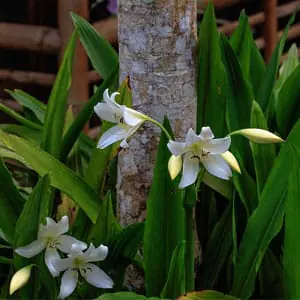
Tod Swanson is a Center for Biodiversity Outcomes Faculty Affiliate and Professor in The School of History Philosophy and Religious Studies. He studies language of indigenous people and how language co-evolves with the relationship between people and nature.
Tod grew up in Ecuador and married a woman from a small native community found on the banks of the Napo River in the Amazon jungle. Tod and his extensive Ecuadorian family speak Spanish when they have to, but their native tongue is Kichwa, one of several indigenous languages in Amazonia. The family owns a 600 hectare reserve of rainforest, where they operate the Andes and Amazon Field School.
I recently had the privilege to go on a rainforest walk with Tod and some of his family members, Pedro Andi and Eulodia Dagua, who spoke to us in Kichwa (Todd translated). During our walk, Tod stopped at key plant species and described Kichwa stories about interactions between these trees and other plant and animal species, how the ecology of those interactions was ingested into human lore and, in turn, how this lore influenced—and indeed generated—language. The stories unveiled not just perceptions and uses of nature, but instead an entirely different paradigm in which nature underlies language, culture and human well-being.
Tod translated Eulodia’s story about a particular (in this case roadside) medicinal plant. The Kichwa believe that plants have qualities and that if ingested these qualities are transferred to the consumer via dreams of a healer that transfers those qualities to the user.
We learned about a Kichwa rain ritual in which community elders set out into the rainforest to burn a palm tree and witnessed a charred palm. These are elders, not vandals. This is not just any palm, it is a particular palm that has the role of guarding the forest. The elders afflict this injustice on the noble tree to transform it to smoke—a spirit that will cause the sky to open up with vengeance and flood the earth in retaliation. This traditional “rain dance” had just transpired several days ago. Apparently it worked—it’s raining! It rains similar to the monsoon in Arizona, only it doesn’t stop. The nearby Napo River has risen 10 feet.
A traditional Kichwa song. This song is again connected to nature. The tree in the background is a shiwa, the fruit of which is a favorite of the toucan. Toucans mate for life; this song is about death and loss of a life partner. Eulodia has just lost her mother, so this performance is particularly poignant.
This work is inspiring in many ways. First, understanding native dialects and the nuances of words provides a certain level of depth in understanding how the Kichwa view nature. Understanding these perceptions of nature sheds a refreshing light on linkages between biodiversity and the culture of native communities.